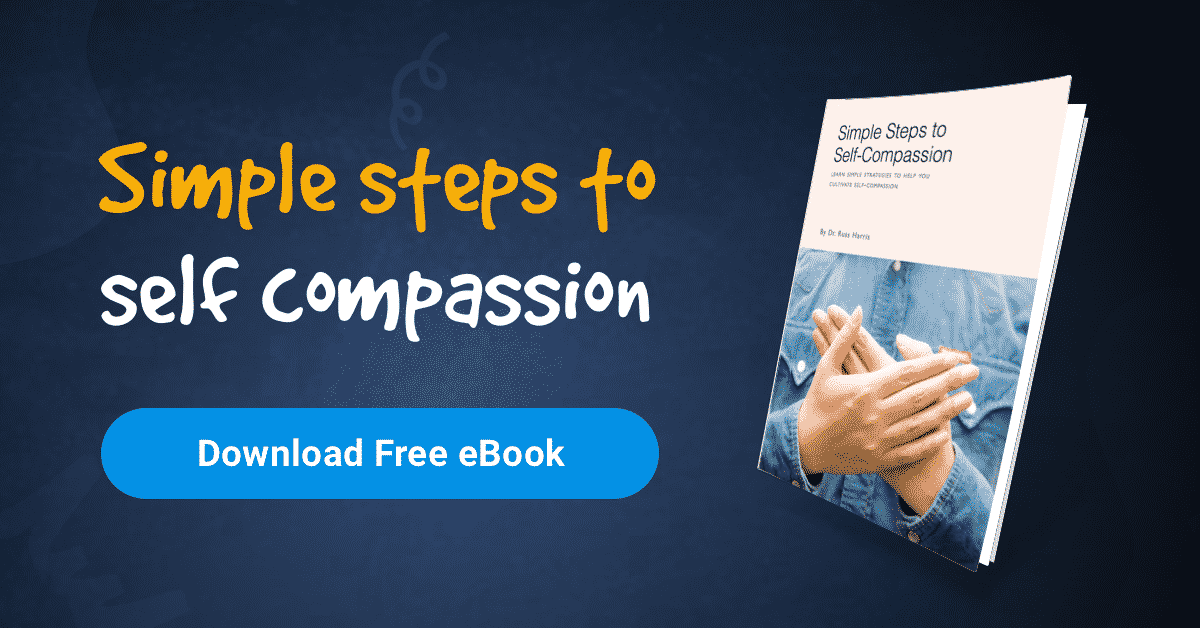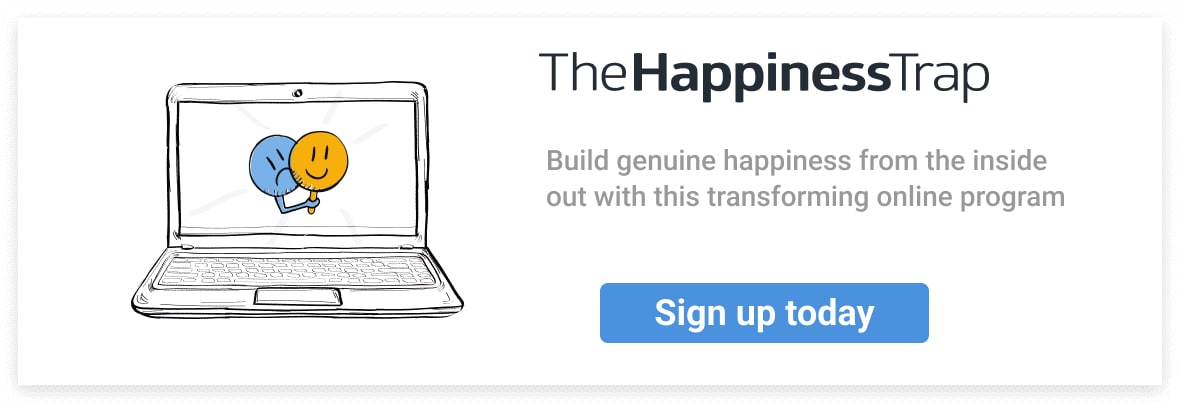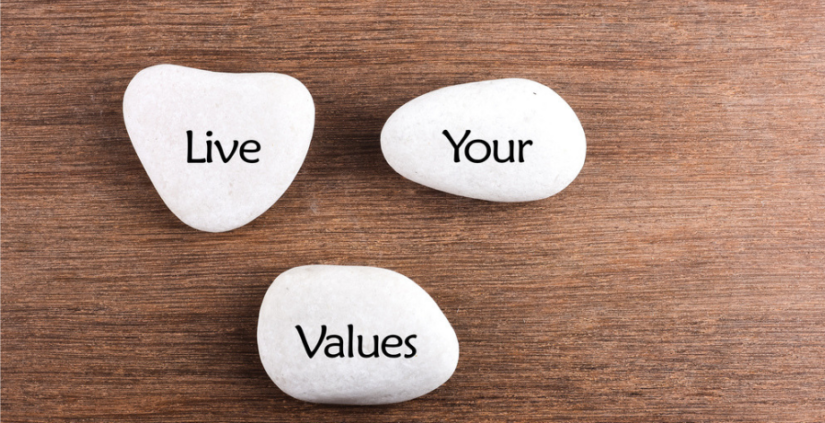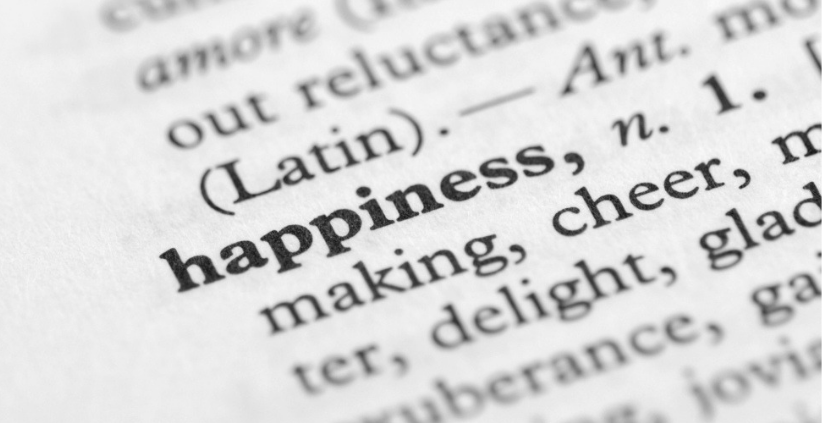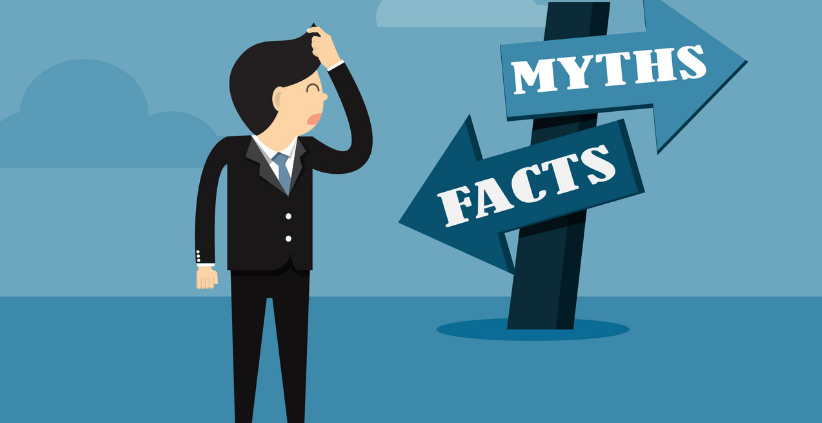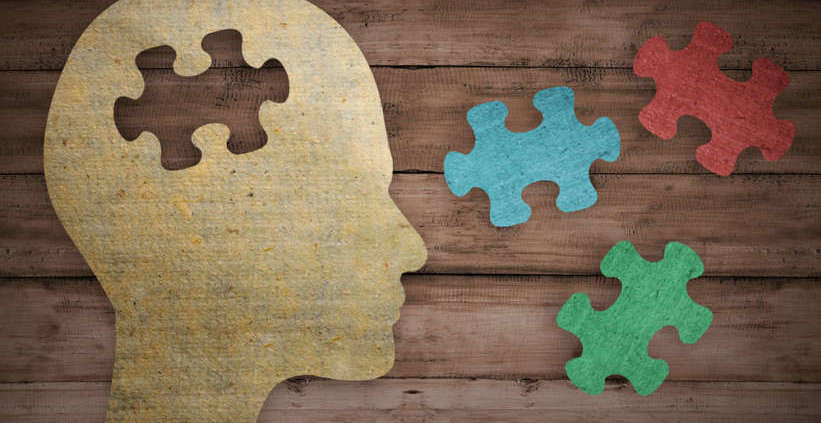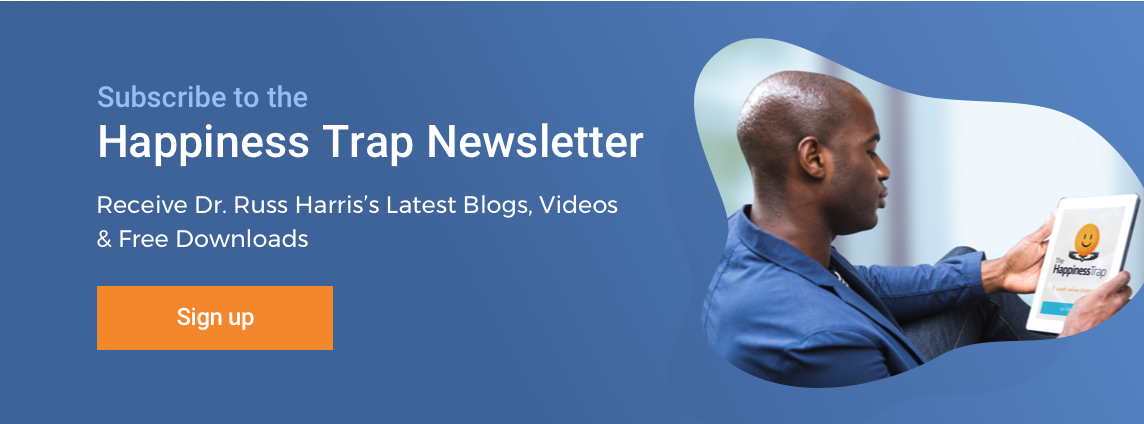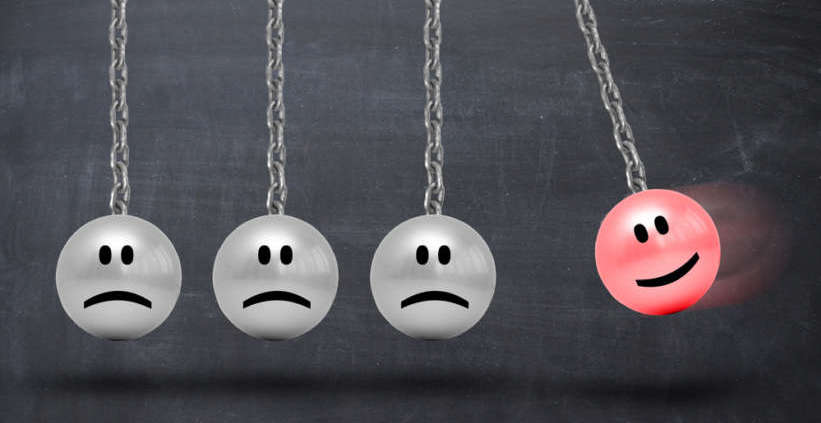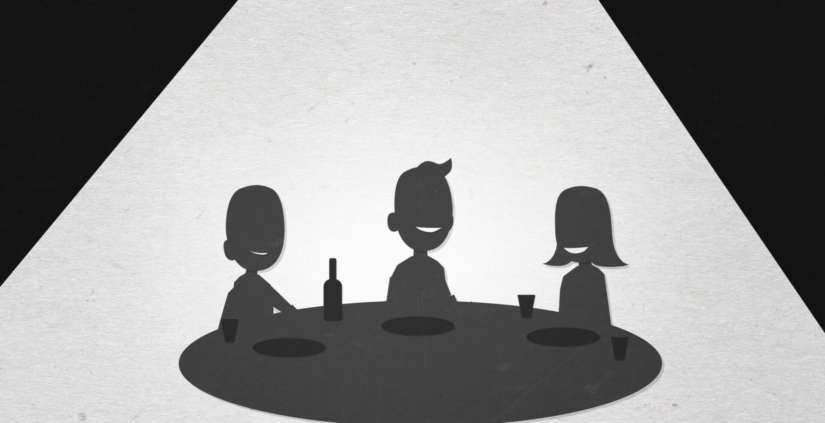

Extract from the Happiness Trap, by Dr. Russ Harris.
Myth No. 1: Happiness Is The Natural State For All Human Beings
Our culture insists that humans are naturally happy.
Remember, one in ten adults will attempt suicide, and one in five will suffer from depression.
What’s more, the statistical probability that you will suffer from a psychiatric disorder at some stage in your life is almost 30 per cent! Not exactly great odds, are they?
And when you add in all the misery caused by problems that are not classified as psychiatric disorders — loneliness, divorce, sexual difficulties, work stress, midlife crisis, relationship issues, domestic violence, social isolation, bullying, prejudice, low self-esteem, chronic anger and lack of meaning or purpose in life — you start to get some idea of just how rare true happiness really is.
Unfortunately, many people walk around with the belief that everyone else is happy except for them. And — you guessed it — this belief creates even more unhappiness.
Myth No. 2: If You’re Not Happy, You’re Defective
Following logically from Myth 1, western society assumes that mental suffering is abnormal. It is seen as a weakness or illness, a product of a mind that is somehow faulty or defective.
This means that when we do inevitably experience painful thoughts and feelings, we often criticise ourselves for being weak or stupid.
Health professionals contribute to this process by readily slapping on labels such as, ‘You’re depressed’, and these labels merely confirm how defective we are.
Acceptance and Commitment Therapy is based on a dramatically different assumption. ACT proposes that the normal thinking processes of a healthy human mind will naturally lead to psychological suffering.
You’re not defective — your mind’s just doing its job; the thing it evolved to do. Fortunately, ACT can teach you how to adapt to this in such a way that your life will be powerfully transformed.
Myth No. 3: To Create A Better Life, We Must Get Rid Of Negative Feelings
We live in a feel-good society, a culture thoroughly obsessed with finding happiness. And what does that society tell us to do? To eliminate ‘negative’ feelings and accumulate ‘positive’ ones in their place. It’s a nice theory and on the surface it seems to make sense.
After all, who wants to have unpleasant feelings? But here’s the catch: the things we generally value most in life bring with them a whole range of feelings, both pleasant and unpleasant.
For example, in an intimate long-term relationship, although you will experience wonderful feelings such as love and joy, you will also inevitably experience disappointment and frustration.
There is no such thing as the perfect partner and sooner or later conflicts of interest will happen.
The same holds true for just about every meaningful project we embark on. Although they often bring feelings of excitement and enthusiasm, they also generally bring stress, fear and anxiety.
So if you believe Myth 3, you’re in big trouble, because it’s pretty well impossible to create a better life if you’re not prepared to have some uncomfortable feelings.
Myth No. 4: You Should Be Able To Control What You Think And Feel
The fact is, we have much less control over our thoughts and feelings than we would like. It’s not that we have no control; it’s just that we have much less than the ‘experts’ would have us believe. However, we do have a huge amount of control over our actions.
And it’s through taking action that we create a rich, full and meaningful life. (That’s why we say ACT as the word ‘act’, rather than as the initials A.C.T.)
The overwhelming majority of self-help programs subscribe to Myth 4.
For example, many approaches teach you to identify negative thoughts and replace them with more positive ones.
Other approaches encourage the repetition of positive affirmations such as, ‘Everything that happens is for my highest good and greatest joy’, or ‘I am strong, able and capable at all times’.
Still other approaches encourage you to visualise what you want, to vividly imagine yourself the way you want to be, living the life you dream of.
The basic theme of all these approaches is this: if you challenge your negative thoughts or images and, instead, repeatedly fill your head with positive thoughts and images, you will find happiness. If only life were that simple! I’m willing to bet that you’ve already tried countless times to think more positively about things and yet those negative thoughts keep coming back again and again.
Our minds have evolved over a hundred thousand years to think the way they do, so it’s not likely that a few positive thoughts or affirmations will change them all that much!
It’s not that these techniques have no effect; they can often make you feel better temporarily.
But they will not get rid of negative thoughts over the long term.
The same holds true for ‘negative’ feelings such as anger, fear, sadness, insecurity and guilt.
There are multitudes of psychological strategies to ‘get rid of’ such feelings. But you’ve undoubtedly discovered that even if they go away, after a while they’re back. And then they go away again.
And then they come back again. And so on and so on. The likelihood is, if you’re like most other humans on the planet, you’ve already spent a lot of time and effort trying to have ‘good’ feelings instead of ‘bad’ ones — and you’ve probably found that as long as you’re not too distressed, you can, to some degree, pull it off.
But you’ve probably also discovered that as your level of distress increases, your ability to control your feelings progressively lessens. Sadly, Myth 4 is so widely believed that we tend to feel inadequate when our attempts to control our thoughts and feelings fail.
These four powerful myths provide the basic blueprint for the happiness trap.
They set us up for a struggle we can never win: the struggle against our own human nature. It is this struggle that builds the trap.
What’s the most important thing in life? A lot of people, when first asked this question, answer… HAPPINESS!
But did you know, there is a large and growing body of scientific research that shows the harder you try to control the way you feel, the more miserable you are likely to become?
Watch this quick video to learn more.
The Difference Between a Goals and Values Focused Life
Society tells us the way to be happy is to achieve our goals. But there is a radically different way to live your life. A life based on values.
Watch this quick video to learn more.
Extract from the Happiness Trap by Dr. Russ Harris
We all want it. We all crave it. We all strive for it.
Even the Dalai Lama has said: ‘The very purpose of life is to seek happiness.’ But what exactly is this elusive thing we are looking for?
The word ‘happiness’ has two very different meanings. Usually it refers to a feeling: a sense of pleasure, gladness or gratification.
We all enjoy happy feelings, so it’s no surprise that we chase them. However, like all our other feelings, feelings of happiness don’t last. No matter how hard we try to hold on to them, they slip away every time.
And as we shall see, a life spent in pursuit of those feelings is, in the main, unsatisfying.
In fact, the harder we pursue pleasurable feelings, the more we are likely to suffer from anxiety and depression. The other meaning of happiness is ‘a rich, full and meaningful life’.
When we take action on the things that truly matter deep in our hearts, when we move in directions that we consider valuable and worthy, when we clarify what we stand for in life and act accordingly, then our lives become rich and full and meaningful, and we experience a powerful sense of vitality.
This is not some fleeting feeling – it is a profound sense of a life well lived. And although such a life will undoubtedly give us many pleasurable feelings, it will also give us uncomfortable ones, such as sadness, fear and anger.
This is only to be expected. If we live a full life, we will feel the full range of human emotions.
In the book, The Happiness Trap, as you’ve probably guessed by now, we are far more interested in the second meaning of happiness than in the first.
Of course, happy feelings are quite pleasant, and we should certainly make the most of them when they present themselves. But if we try to have them all the time, we are doomed to failure.
The reality is, life involves pain. There’s no getting away from it. As human beings we are all faced with the fact that sooner or later we will grow infirm, get sick and die. Sooner or later we all will lose valued relationships through rejection, separation or death.
Sooner or later we all will come face-to-face with a crisis, disappointment and failure. This means that in one form or another, we are all going to experience painful thoughts and feelings.
The good news is that, although we can’t avoid such pain, we can learn to handle it much better – to make room for it, rise above it and create a life worth living.
Extract from The Happiness Trap, written by Dr. Russ Harris
To answer this question, we need to take a journey back in time. The modern human mind, with its amazing ability to analyse, plan, create and communicate, has largely evolved over the last hundred thousand years, since our species, Homo sapiens, first appeared on the planet.
But our minds did not evolve to make us feel good, so we could tell great jokes, write sonnets and say ‘I love you’.
Our minds evolved to help us survive in a world fraught with danger. Imagine that you’re an early human hunter–gatherer. What are your essential needs in order to survive and reproduce?
There are four of them: food, water, shelter and sex, but none of these things mean much if you’re dead. So the number one priority of the primitive human mind was to look out for anything that might harm you and avoid it!
In essence, the primitive mind was a ‘Don’t get killed’ device, and it proved enormously useful. The better our ancestors became at anticipating and avoiding danger, the longer they lived and the more children they had. With each generation the human mind became increasingly skilled at predicting and avoiding danger.
And now, after a hundred thousand years of evolution, the modern mind is still constantly on the lookout for trouble. It assesses and judges almost everything we encounter: Is this good or bad? Safe or dangerous? Harmful or helpful?
These days, though, it’s not sabre-toothed cats or 200- kilogram wolves that our mind warns us about. Instead it’s losing our job, being rejected, getting a speeding ticket, not being able to pay the bills, embarrassing ourselves in public, upsetting our loved ones, getting cancer, or any of a million and one other common worries.
As a result we spend a lot of time worrying about things that, more often than not, never happen. Another essential for the survival of any early human is to belong to a group. If your clan boots you out, it won’t be long before the wolves find you. So how does the mind protect you from rejection by the group? By comparing you with other members of the clan:
Am I fitting in? Am I doing the right thing? Am I contributing enough? Am I as good as the others? Am I doing anything that might get me rejected?
Sound familiar? Our modern-day minds are continually warning us of rejection and comparing us against the rest of society. No wonder we spend so much energy worrying whether people will like us! No wonder we’re always looking for ways to improve ourselves or putting ourselves down because we don’t ‘measure up’.
A hundred thousand years ago we had only the few members of our immediate clan to compare ourselves with. But these days we can open any newspaper or magazine, switch on any television, tune in to any radio, and instantly find a whole host of people who are smarter, richer, taller, slimmer, sexier, stronger, more powerful, more famous, more successful, or more admired than we are. What’s the fastest way to make a teenage girl depressed?
Show her a fashion magazine. When she compares herself to all those air-brushed, collagen-enhanced, digitally altered supermodels, she is guaranteed to feel inferior or downright unattractive.
And the rest of us are not that different. Thanks to evolution, our minds are now so sophisticated they can even dream up a fantasy of the person we’d like to be — and then compare our ‘real’ self to that impossible standard. What chance have we got? We will always end up feeling not good enough!
Now, for any Stone Age person with ambition, the general rule for success is: the more, the better. The more sophisticated your weapons (and the more of them you have), the more food you can kill. The more plentiful your food stores, the better your chances are for living through times of scarcity. The more substantial your shelter, the safer you are from weather and wild animals.
The more children you have, the better the chance that some of them will survive into adulthood. No surprise then, that our modern mind continually looks for more: more money, more status, more love, more job satisfaction, a newer car, a younger-looking body, a younger-looking partner, a bigger house. And if we succeed, if we actually get more money or a newer car or a better job, then we’re satisfied — for a while. But sooner or later (and usually sooner), we end up wanting more.
Thus, evolution has shaped our minds so that we are almost inevitably destined to suffer psychologically: to compare, evaluateand criticise ourselves; to focus on what we’re lacking; to be dissatisfied with what we have; and to imagine all sorts of frightening scenarios, most of which will never happen.
No wonder humans find it hard to be happy!

